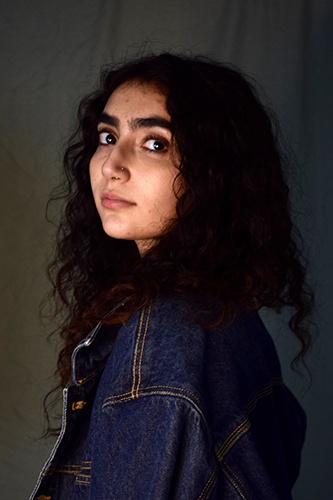
The New York Times has a weekly installment called “By the Book” which is a series of questions and answers about the reading habits of notable writers. This chapter features student Christina Fares ’22.
As a person of Greek and Lebanese origins, are there any books from those traditions you would recommend?
Greek mythology has been a centerpiece in my childhood. I remember telling the other kids in my elementary school that I truly believed in the 12 Gods on Mount Olympus. My annual trips to Greece to visit my family continuously fed into my Greek mythology addiction, especially when visiting the temples, most recently the Parthenon. Sitting on the beach in my mother’s home city, I could view Mount Olympus. I memorized countless myths, and many of the books I read on them are still on my bookshelf. My favorite tale is the story of Perseus. Multiple stories contribute to this singular one, such as the myth of Medusa, Andromeda, and his own mother, Danaë.
Who is your favorite fictional hero and who is your favorite fictional anti-hero, or villain?
On the topic of Greek mythology, my favorite hero would be Athena. One of my favorite stories of hers is the one about her and Arachne, although that particular myth might have also caused my fear of spiders. In the story, Athena and Arachne have a weave-off, which resulted in Athena transforming Arachne into a spider to teach her a lesson. My favorite villain is Hera. I do not see Hera as a villain, and the world’s portrayal of her is a good representation of how society treats women. Hera’s husband Zeus had cheated on her multiple times while she was portrayed as evil for getting revenge. Overall, she deserved better treatment.
You are organizing a dinner party. Which five writers, dead or alive, do you invite?
Although it might sound cliché, I would invite William Shakespeare. He was a revolutionary, and I would find it interesting to meet the man behind all the plays that are still relevant in English literature hundreds of years later. Next, I would invite Jarrett J. Krosoczka, who is mostly known for writing the Lunch Lady series. He was a big deal to many kids I knew, at least in my school. Recently, he released a more serious graphic novel about his childhood. Based on this, I am curious to learn more about him as a person. I would also invite Vera Brosgol. She wrote one of my favorite graphic novels, Anya’s Ghost. I first read the book when I was in fifth grade, and whenever I cross paths with it again, I find myself rereading it. My fourth guest is known for her poems featuring simple sketches at the bottom of the page. Rupi Kaur would be an enlightening guest at my dinner party. Her poems highlight her emotional maturity, and I know I would enjoy having an intellectual conversation with her. Lastly, I would invite Marjane Satrapi. I first read her book Persepolis when I was in middle school, and like Anya’s Ghost, I always reread it. What makes this writer so unique to me is how, on some level, I can relate to her. These writers have contributed a lot to my life, and if I were able to have a party with them, my younger self would be proud. It would also be quite quirky to have a diverse group of writers converse at a dinner party.
Do you like being read to – or reading aloud?
I would much rather read out loud than be read to. Reading out loud allows me to capture more of the senses, including auditory, visual, and tangible (holding the book) sense. Being read to is more passive, while reading aloud is active, and helps me understand the story better.
Which genres do you especially enjoy reading – and which do you avoid?
My all-time favorite type of genre is graphic novels/memoirs. I have always been fascinated by the art in the books. Whenever I am browsing for new books to read, I am immediately drawn to graphic novels; I would never say no to reading one! I do not have a least favorite type of genre, but if I am given a book and dislike the first chapter, I will not give the book a second glance. The first chapter is the first impression; if it doesn’t impress me, it is not worth reading.
Which book might we be surprised to find on your bookshelves?
A surprising book I have on my bookshelf is The Science of Self-Realization by A.C. Bhaktivedanta Swami Prabhupada. A couple of years back, I walked around Boston with my family, and then headed off to find a Starbucks. I began to trail farther and farther away from them, as I was invested in my phone – until a woman stopped me. She asked me if I was Hindu and interested in participating in a Hindu ceremony in the temple with her that night. Before I could respond, she handed me this book and said that I seemed to be much more knowledgeable than the average person. I never had the chance to read the book, but I still keep it on my bookshelf to remind myself of that moment.